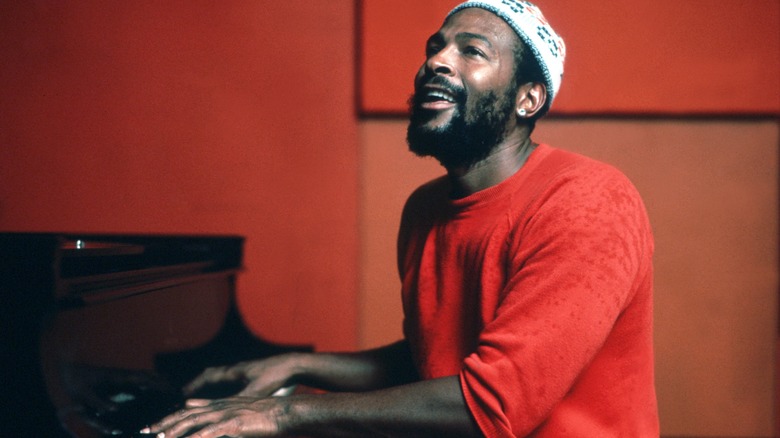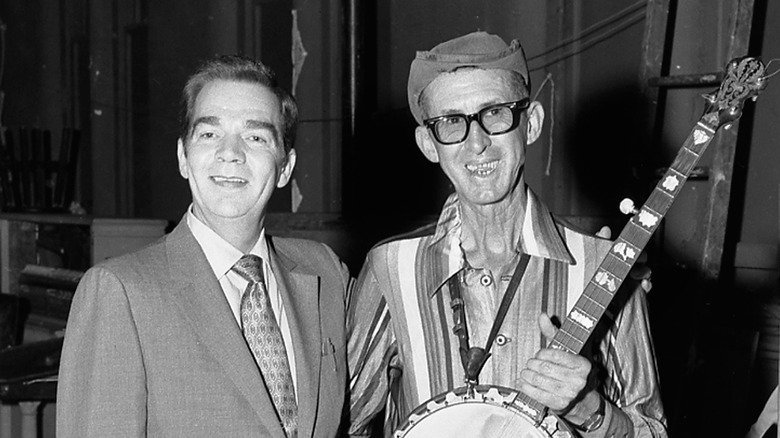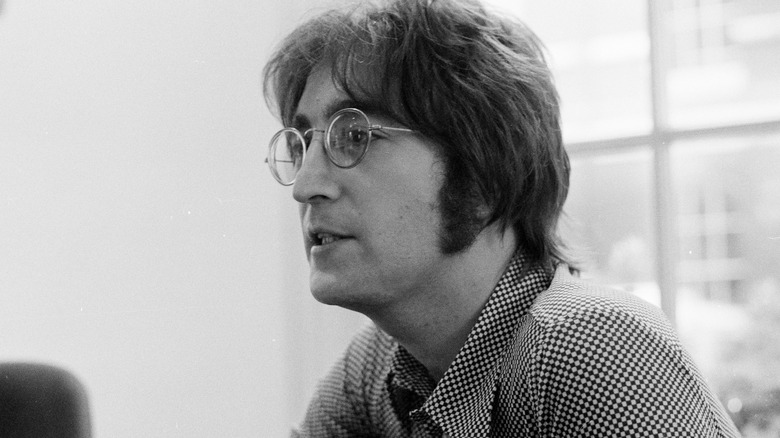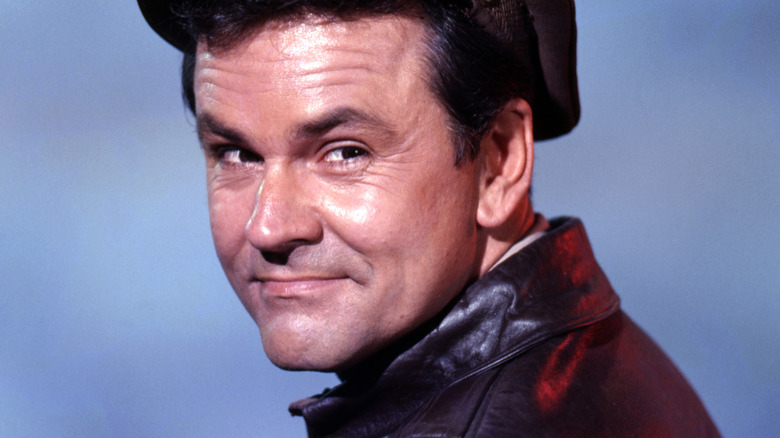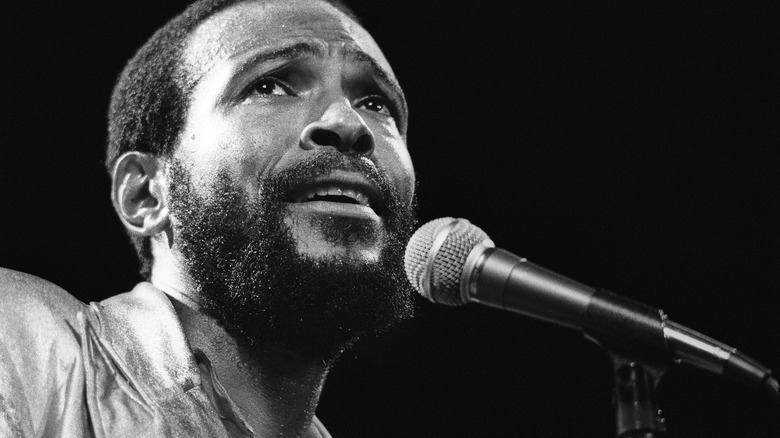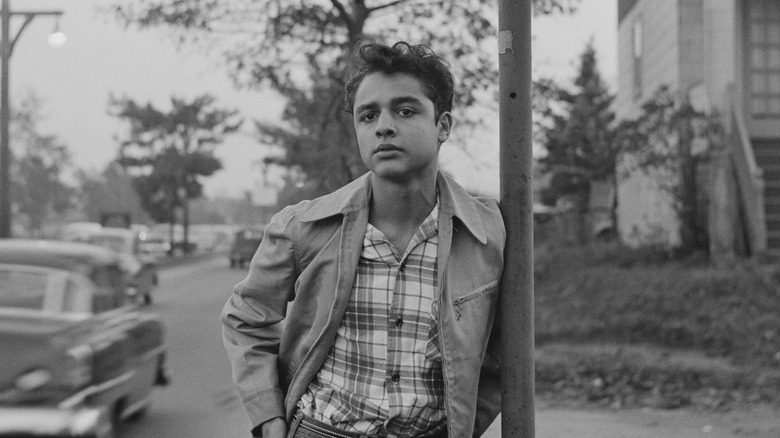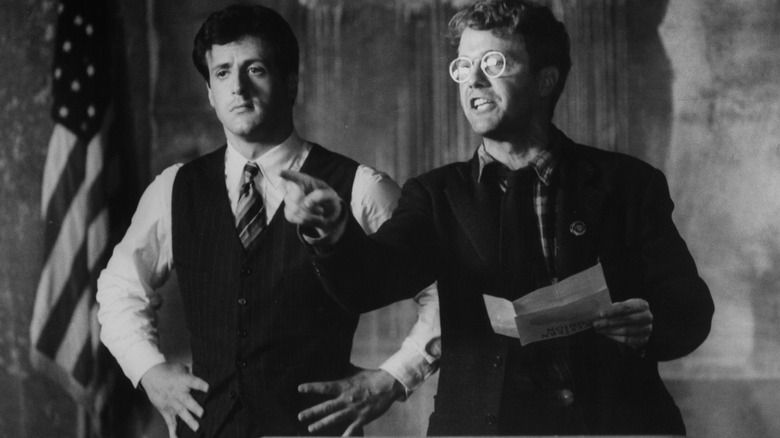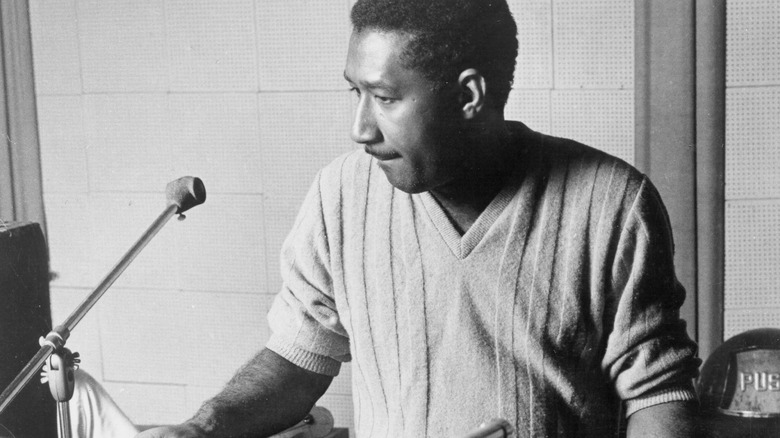'70s Stars Who Were Tragically Murdered
Nostalgia is a powerful feeling, and interestingly, that's true on a biological basis. Studies done on nostalgia have found (via National Geographic) that brain activity tends to increase when we're thinking about fond memories, which explains why there are so many social media pages dedicated to the good old days of the 1970s and '80s. Baby boomers and GenXers love their actors, musicians, and models, so it's a hard day when they pass away. As hard as that is to face, it's also important to remember that some didn't get the chance to coast into old age on a wave of nostalgia, and had their careers — and lives — cut brutally short by unthinkable violence.
It's no secret that we tend to put celebrities on a pedestal, and the idea that they could be targeted by a random — or not-so-random — act of extreme violence is an uncomfortable one to deal with. But it happens, and it always has: Do some digging, and it quickly becomes clear that some of the most popular actors, most talented musicians, and most beautiful people of the era couldn't be protected by their status. In some cases, they died because of it.
Whether they were at the height of their career or just taking off, it's equally tragic. And even worse? Some of these murders remain unsolved to this day, and given the passage of time, it's unlikely that some of these killers will ever be brought to justice.
David Stringbean Akeman
David "Stringbean" Akeman (right) was one of country music's biggest stars, a banjo-playing comic who was a natural hit on the ever-expanding medium that was television. His immense popularity allowed him to live a life that he loved: He played his banjo and told his jokes, and when he wasn't on stage, he worked on his farm near Ridgetop, Tennessee. "They told us how safe and serene it was," family friend Steve Gibson recalled (via The Tennessean). Akeman's wife, Estelle, reportedly told Gibson's mother, "We're so happy here, we want to live in this little cabin 'til the day we die.'"
That day was November 10, 1973. That's when the couple returned from a Grand Ole Opry performance to find several masked men waiting for them. The planned robbery ended in bloodshed, when David was shot and killed by a panicked (and drunk) would-be robber inside his home, and Estelle was murdered on the front lawn as she tried to run.
Their bodies were found the following morning by friend, costar, and "Hee Haw" mainstay Grandpa Jones, and it devastated the industry. Two men were arrested, charged, and convicted of murder (with two others charged as accessories). One died in 2003 while still serving his sentence, and the other was paroled and released in 2014. It was a decision that singer Mac Wiseman called (via USA Today) a "great miscarriage of justice," adding, "It makes me question the legal system."
John Lennon
John Lennon gave his final interviews in the days before his death, and eerily, he talked about the champions of non-violence and their tendency to die in brutal ways. In an interview for Playboy, he told journalist David Sheff (via E! News), "Mahatma Gandhi and Martin Luther King are great examples of fantastic non-violents who died violently. I can never work that out. We're pacifists, but I'm not sure what it means when you're such a pacifist that you get shot. I can never understand that."
A few months later, he was dead. The details are well known: On December 8, 1980, Mark David Chapman met Lennon, got an autograph, and later shot him in the back on the street outside his home. Chapman had previously been obsessed with The Beatles and "The Catcher in the Rye," which he was reading when he was arrested at the scene. He entered a guilty plea, was given 20 years to life, and has been denied parole.
Chapman eventually gave some interviews, saying (via CNN) that things started to go sideways with Lennon's "more popular than Jesus" comment. It deeply offended the devout Chapman, who said that eventually turned into an obsession with murder. Not long before the killing, Chapman told his wife, Gloria, what he planned on doing. "I still have deep-seated resentment that she didn't go to somebody, even the police, and say, 'Look, my husband bought a gun, and he said he was going to kill John Lennon,'" he told CNN. Chapman and Gloria are still married.
Bob Crane
Bob Crane's murder remains unsolved. It was a bizarre end to the story of one of the most popular shows of the era, the Nazi-ridiculing "Hogan's Heroes," and it was a shockingly brutal crime. Law enforcement responded to a Scottdale, Arizona, apartment complex to find Crane bludgeoned beyond recognition. When they asked a local theater director (who had leased the apartment) to identify the body, Ed Beck said, "There was no way I could identify him from one side. The other side, yes."
That was on June 29, 1978. What unfolded afterward was the airing of what was sort of the best-kept secret in Hollywood. Crane's son, Robert, has been candid about his father's addiction to sex, X-rated dressing room photos, and on-set affairs, but stresses that everything was consensual. He's also claimed that his father's death had more to do with his desire to reboot his life and career than any sexual indiscretions.
Longtime friend John Henry Carpenter — who set Crane up with the video equipment he needed to make his own X-rated films — was an immediate suspect but was never convicted. Robert says that he believes his father died because he wanted to move away from the circle of people that included Carpenter, and he explained to Entertainment Weekly that even decades later, wounds hadn't healed. "There's still fog. And when I say 'fog,' it's that word 'closure,' which I hate. But there is no closure. You live with death for the rest of your life."
Marvin Gaye
Murder is always tragic, but it turns out that Marvin Gaye's death was even more tragic than many may have realized. It was no secret that his relationship with his father was a difficult one, to say the least, and he and his siblings spoke of some terrible brutality — including regular whippings — handed out by the family patriarch. Gaye was quoted as saying (via Smooth Radio), "Living with Father was like living with a king, an all-cruel, changeable, cruel, and all-powerful king."
Things apparently came to a head on April 1, 1984, when Gaye got involved in an argument between his parents. The cause of the argument was apparently a misplaced letter, and things escalated into a physical altercation. Gaye's mother, Alberta, would later recall: "I was standing about eight feet away from Marvin, when my husband came to the door of the bedroom with his pistol. ... He, my husband, shot — and Marvin screamed. I tried to run. Marvin slid down to the floor after the first shot."
Marvin Gay Sr. later claimed that his son was violent and unpredictable, and that he hadn't meant to kill him when he shot him. He added that he thought there were blanks in the gun, and was ultimately given a six-year suspended sentence and five years of probation. He died in 1998.
Jaco Pastorius
The tragic 1987 death of Jaco Pastorius came at the end of a turbulent time for the groundbreaking bassist. Although he had spent the late 1970s and early '80s playing and touring with some of the biggest names out there, he soon struggled with a life derailed by drug and alcohol use. He made headlines for violent altercations and probation violations, with his brother explaining that he struggled with mental health issues made worse by alcohol use.
Pastorius ended up moving to Florida and quickly gained a reputation that saw him banned from several nightclubs. That's what ultimately led to his tragic death: It was reported that he had been attempting to force his way into a nightclub when he was beaten by a club manager. The incident happened on September 12, 1987, and he remained unresponsive until he was removed from life support on September 21.
Nightclub manager Luc Havan was charged with second degree murder, but pleaded guilty to manslaughter. He was sentenced to 21 months in jail, and was released after serving four.
Sal Mineo
In 2018, crime writer James Ellroy published his account (in The Hollywood Reporter) of a tragic 1976 Hollywood murder, pieced together from the LAPD's files on the case. It starts with law enforcement being summoned to a grisly scene at a West Hollywood carport. The initial report described the victim with "a stab wound in his upper left chest. It's a bad wound. The blood flow extends 10 feet plus. The wound goes deep. That's evident. Blood runs east, down the alley."
The victim was Sal Mineo, who hit it big in "Rebel Without a Cause" and remained a Hollywood mainstay. Eyewitnesses to the death described a young, white male with long hair fleeing the scene of the crime, and that ended up being a major problem. Law enforcement started looking for someone who fit that description, and turned their attention to former associates of Mineo — particularly, ex-lovers. It wasn't until more than a year into the investigation that detectives realized the white man they had been chasing was not the actual killer, which finally led them to Lionel Williams.
Williams' girlfriend told law enforcement that he had admitted to killing "a young-looking white dude in Hollywood," intending to rob him. There was no money to be stolen, and Williams later identified his victim as Mineo. LA police followed him to Michigan, and Williams was arrested, charged, convicted, and sentenced to 51 years for the murder and a series of robberies.
David Huffman
David Huffman (pictured, in "F.I.S.T." with Sylvester Stallone) was a '70s-era television staple, appearing in a slew of shows right up until his tragic death in 1985. Huffman was killed in San Diego's Balboa Park, and his body was discovered in perhaps the worst way imaginable: by children on a school field trip. Authorities quickly determined that Huffman had been stabbed several times, and when they put out a request for any information that would lead to the killer, a crucial lead came from an unlikely source: a Canadian couple.
They had been in Balboa Park at the time Huffman was killed, and told law enforcement that while they were there, they'd seen someone suspicious searching their motor home. Huffman, they said, had given chase. That information led to the arrest of a 16-year-old who was identified from a police composite sketch.
The story that unfolded is about as tragic as it gets. Huffman had come to the aid of the couple, chased Genaro Villanueva away, and was stabbed for his good deeds. At Villanueva's trial, Huffman was lauded as "a citizen willing to be involved, willing to endanger himself, to help two older persons." Villanueva — who was 17 years old at the time he was sentenced — was convicted and given 26 years to life. Judge Norbert Ehrenfreund explained (via the Los Angeles Times), "There was no conscious conscience, no feelings, no morals, to get in the way of Genaro's stabbing the victim five times repeatedly."
Al Jackson Jr
Al Jackson Jr. was a founding member of Booker T. and the MG's, one of the many 1960s and '70s-era groups credited with overhauling the soul music scene. Behind the scenes, though, Jackson lived an almost shockingly volatile life, including a July 1975 incident where he was shot by his wife after an argument turned violent. Barbara Jackson claimed self-defense, and even as assault-with-intent-to-murder charges were dismissed, the couple continued to live together as Booker T. and the MG's looked ahead to newly booked recording dates. Al would be dead before making it back into the studio.
On October 1, 1975, a law enforcement officer driving past the Jackson home found Barbara fleeing the house, her hands still bound by a cord. Al was dead inside, and Barbara would later testify that she had been home alone when a would-be thief forced his way inside, tied her up, and threatened her before ransacking the house. Al returned home mid-robbery, was forced to the floor at gunpoint, and then was shot in the back five times.
Although Barbara's statements indicated her husband might have known his killer, the case remains unsolved. Some say it was a random, senseless act of violence, but others think it had something to do with the end of Stax Records. That in itself is a complicated, confusing mess of court cases and accusations of unpaid royalties, and although other Booker T. and the MG's members deny that's the case, the theory's hung on over the decades.
Peter Tosh
Bob Marley and the Wailers may have sung about peace, but the death of founding band member Peter Tosh was anything but peaceful. On September 11, 1987, Tosh was at his home with a group of friends when three armed men forced their way in. By the time the brutal attack was over, seven people had been shot, with three of the victims, including Tosh, suffering fatal wounds. It was almost immediately reported that the motive was assumed to be robbery.
In 2018, Carlton "Santa" Davis — a friend who had been there and was wounded in the shooting — shared his recollections of the event (via Relix). Davis recalled that hot, steamy night in Kingston, Jamaica: "I was next to Peter," he said. "I heard the gun strike his flesh as they pistol-whipped him. I heard him grunt as they hit him over and over. It was heartbreaking, knowing I could do nothing to help my brother as they beat him while demanding money that wasn't there." Davis said that he knew the way things were going to go when he realized the attackers weren't wearing masks and weren't worried about being identified: "When they were done taking our money, I heard one of them say to Peter: 'You're dying tonight.' For a moment, there was silence. And then the guns started [to] ring."
Dennis "Leppo" Lobban was arrested, convicted, and sentenced to death row, though he continued to maintain his innocence.
Dorothy Stratten
Dorothy Stratten was discovered in 1978, and those who worked with her described her as an otherworldly beauty who saw the best in people. In an interview with ABC News, Max Baer Jr. — of "The Beverly Hillbillies" fame — said that when his friend Paul Snider brought her to Los Angeles from Vancouver, he warned him it wasn't going to end well. "I said [to Snider] ... 'if you really care about her ... take her back to Vancouver. She doesn't belong here.' I said, 'She's nice. She's got a great figure, got a beautiful face, and this town will destroy her.'"
A Playboy shoot catapulted Stratten into a fame that those who knew her said she was vastly unprepared for. In the process, they added, she became increasingly dependent on Snider for support. They married, and her career went from Playboy to more mainstream movies and television. But as she found her footing, their relationship unraveled.
By August of 1980, divorce was in the cards. Stratten and Snider shared their home with Patti Laurman, a prospective model, and Stephen Cushner. Stratten moved out — and in with Peter Bogdanovich — but it was Laurman and Cushner who found Stratten's grisly murder scene. Laurman told ABC News, "It looked like it was a horror movie — a staged horror movie — like mannequins and fake blood. That's a picture that never goes away, a mental picture that's stuck in here forever." Authorities later determined the Snider had killed her after sexually assaulting her, then died by suicide.
Star Stowe
Star Stowe enjoyed a brief burst of fame in the 1970s: In addition to traveling in the circles of rock-star royalty — even dating Gene Simmons — she was one of Playboy's Playmates of the Month in 1977. In 2023, she was the subject of an episode of "The Playboy Murders," one called "The Girl with the Star Tattoo."
Stowe's body was discovered on March 16, 1997, behind a pharmacy in Florida. Tentative connections were made with the deaths of 32-year-old Sandra Kay Walters — who had also been strangled and dumped — and a third woman, Tammy M. Strunk, who appeared to have been killed in a similar fashion. But law enforcement was hesitant to suggest that there was a serial killer stalking the area's brown-eyed, light-haired, slender women.
What happened between Stowe's rock-star days and her brutal murder is largely speculation. The Sun Sentinel reported their findings that she had married, had a son, divorced, and gotten involved with sex work in Florida. The news outlet also reached out to Playboy, and perhaps bizarrely, their director of communications had something to say that ... wasn't that great. Bill Farley explained that Stowe's story of drugs and sex work wasn't an unfamiliar one: "Some girls take advantage of the lifestyle, but others drift off. They marry badly or get involved with the wrong man." (Curious about the worst things revealed about life in the Playboy mansion?) Although Stowe's case went cold, the investigation into her death was reopened in 2023.
If you or anyone you know needs help with addiction issues or is dealing with domestic abuse, contact the relevant resources below:
- Visit the Substance Abuse and Mental Health Services Administration website or contact SAMHSA's National Helpline at 1-800-662-HELP (4357).
- Call the National Domestic Violence Hotline at 1−800−799−7233. You can also find more information, resources, and support at their website.
